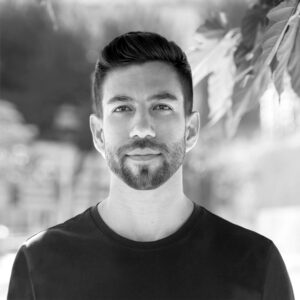
In this video:
Susan Magsamen is the founder and executive director of the International Arts + Mind Lab (IAM Lab), Center for Applied Neuroaesthetics, a groundbreaking neuroaesthetics initiative at Johns Hopkins University School of Medicine. In addition to her role at IAM Lab, she is the co-director of the NeuroArts Blueprint project in partnership with the Aspen Institute. She is also the author of Impact Thinking, an interdisciplinary translational research model, and co-author of the New York Times Bestseller, Your Brain on Art: How the Arts Transform Us written for the general public. Susan’s work focuses on how the arts and aesthetic experiences measurably change the brain, body and behavior and how this knowledge can be translated to inform health, wellbeing and learning programs in medicine, public health and education.
Colin Ellard is a cognitive neuroscientist at the University of Waterloo and director of its Urban Realities Laboratory. Ellard works at the intersection of urban and architectural design and experimental psychology. He has developed a novel set of methods by which the human response to the built environment can be measured using a toolkit consisting of both traditional psychological methods and sensor-based measurements of physiology and brain function. Ellard publishes his work frequently in the peer-reviewed scientific literature but he also engages in extensive knowledge mobilization work involving collaboration and partnership with architects, museums and other NGOs. He travels widely giving keynotes for groups interested in architecture, design, and planning. Ellard is an Urban Design and Mental Health Fellow, a Salzburg Global Fellow and an editor of the Journal of Environmental Psychology and the Journal of Urban Design and Mental Health. Ellard’s most recent book is Places of the Heart (Bellevue Literary Press, 2015).
Itai is a practicing architect, researcher, and multidisciplinary artist focusing on the relationship between people and place. He is the Founder of The Centre for Conscious Design, and Director of Hume – a Science-Informed architecture and urban design practice.
In 2015, Itai founded the Conscious Cities movement; a new field of research and practice for building environments that are aware and responsive, using data analysis, AI, tech, and science-informed design. For his work in advancing changes in the design profession, he was named by Metropolis Magazine as one of 2020’s ‘Game Changers’ in transformative ideas in Health, Social Justice, Technology, and Urbanism.
Itai carries out thought leadership and advisory roles in a number of other research and policy bodies, contributing to strategies that focus on systems change and the promotion of design as a socially conscious profession.
His work and writing has been featured internationally and he is a regular speaker at events focused on the built environment and human impact.
We believe that asking ourselves questions is a form of shedding light, expanding our awareness, our consciousness. Asking a question is a provocation to observe, to inquire, to test, and ultimately to learn and unlearn. In this spirit, we invite you to collectively contemplate our trajectory as a society, to reimagine ourselves through our relationship with place.
Lighthouse events gather the CCD community to set a path of inquiry for the field of Conscious Design and the Conscious Cities Movement. In this event, leading figures in the neuroscience of spatial experience will invite us to explore science’s blind spots. What are the questions that aren’t being asked, and why? What do we stand to gain from exploring the lesser known, and how might we do it?
The questions raised will be gathered and presented as points of departure for upcoming research, writing, and events for the future, including at the following year’s Conscious Cities Festival.
Three of our Lighthouse Fellows, Susan Magsamen, Colin Ellard, and Hugo Spiers will each deliver a short talk. Afterwards, all participants will be invited to smaller breakout rooms where you will have the opportunity to connect and share ideas and provocations.
Organised by
Explore more

Become a Member!
For unlimited access to all articles and videos, become a member though our Patreon. Your support means that we can sustain creating resources and events, elevate a growing community of practice, and further our collective values and mission.
